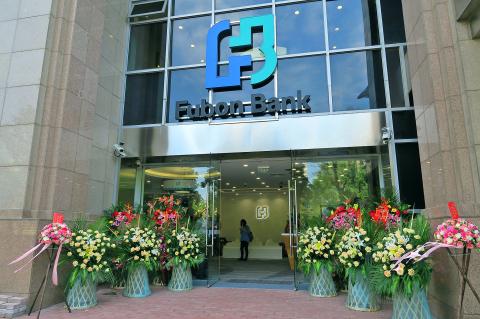Fubon Bank (China) Co (富邦華一), a subsidiary of Fubon Financial Holding Co (富邦金), yesterday opened two branches, one in Beijing and the other in Nanjing, as part of its efforts to deepen its presence in the massive Chinese market.
The opening of the branch in Beijing marked the first time a Chinese bank with a Taiwanese shareholder has gained a foothold in the Chinese capital.
Along with the two newly opened branches, the bank now has 22 branches, including in Shanghai, Shenzhen, Nanjing, Suzhou and Tianjin, where many Taiwanese investors operate their businesses.

Photo: CNA
The bank said the Beijing branch would team up with its branch and sub-branch in Tianjin to explore the financial market in the Bohai Rim area of northern China.
The Beijing branch is expected to help Fubon Financial move closer to the political and economic center of China through its geographic advantage, the bank said.
The bank said the Nanjing branch is part of its strategy to provide better services to Taiwanese investors based in the booming area of Jiangsu Province.
Nanjing has become one of the most important venues for Taiwan’s high-tech firms, the bank said, adding that Taiwan Semiconductor Manufacturing Co (台積電), the world’s largest contract chipmaker, which is building a 12-inch wafer fab in the city, is among the Taiwanese firms in the cluster.
Fubon Financial in 2014 acquired an 80 percent stake in China-based First Sino Bank for 5.65 billion yuan (US$861.5 million at the current exchange rate) and then changed its name.
Under the acquisition’s structure, Fubon Financial holds a 29 percent stake in the bank, while Taipei Fubon Commercial Bank (台北富邦), Fubon’s domestic banking arm, holds a 51 percent stake.
Earlier this month, Fubon Financial announced that it has secured approval from the Shanghai United Assets and Equity Exchange to acquire the remaining 20 percent stake in Fubon Bank (China) at a cost of 2.13 billion yuan to bring the Chinese subsidiary fully under its corporate umbrella.
Fubon Bank (China) said it is planning to open at least three more branches or sub-branches, including offices in Chengdu and Shanghai’s Tongcheng district.

To many, Tatu City on the outskirts of Nairobi looks like a success. The first city entirely built by a private company to be operational in east Africa, with about 25,000 people living and working there, it accounts for about two-thirds of all foreign investment in Kenya. Its low-tax status has attracted more than 100 businesses including Heineken, coffee brand Dormans, and the biggest call-center and cold-chain transport firms in the region. However, to some local politicians, Tatu City has looked more like a target for extortion. A parade of governors have demanded land worth millions of dollars in exchange

Hong Kong authorities ramped up sales of the local dollar as the greenback’s slide threatened the foreign-exchange peg. The Hong Kong Monetary Authority (HKMA) sold a record HK$60.5 billion (US$7.8 billion) of the city’s currency, according to an alert sent on its Bloomberg page yesterday in Asia, after it tested the upper end of its trading band. That added to the HK$56.1 billion of sales versus the greenback since Friday. The rapid intervention signals efforts from the city’s authorities to limit the local currency’s moves within its HK$7.75 to HK$7.85 per US dollar trading band. Heavy sales of the local dollar by

Taiwan Semiconductor Manufacturing Co’s (TSMC, 台積電) revenue jumped 48 percent last month, underscoring how electronics firms scrambled to acquire essential components before global tariffs took effect. The main chipmaker for Apple Inc and Nvidia Corp reported monthly sales of NT$349.6 billion (US$11.6 billion). That compares with the average analysts’ estimate for a 38 percent rise in second-quarter revenue. US President Donald Trump’s trade war is prompting economists to retool GDP forecasts worldwide, casting doubt over the outlook for everything from iPhone demand to computing and datacenter construction. However, TSMC — a barometer for global tech spending given its central role in the

An Indonesian animated movie is smashing regional box office records and could be set for wider success as it prepares to open beyond the Southeast Asian archipelago’s silver screens. Jumbo — a film based on the adventures of main character, Don, a large orphaned Indonesian boy facing bullying at school — last month became the highest-grossing Southeast Asian animated film, raking in more than US$8 million. Released at the end of March to coincide with the Eid holidays after the Islamic fasting month of Ramadan, the movie has hit 8 million ticket sales, the third-highest in Indonesian cinema history, Film